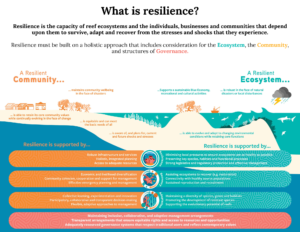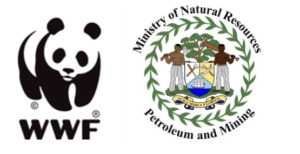Resilient Reefs Initiative
Background
The Resilient Reefs Initiative (RRI) is a global project partnering across four World Heritage reef sites. The objective of the RRI is to bring together local communities, reef managers and resilience experts to build local capacity and develop new solutions under a Resilience Strategy for combating the effects of climate change and other local threats. In 2021, the Coastal Zone Management Authority & Institute (CZMAI) in collaboration with the Fisheries Department and Great Barrier Reef Foundation (GBRF) launched the Resilient Reefs Initiative (RRI) in Belize.
Currently Belize is one of four (4) World Heritage sites that are participating in the pilot phase of Resilient Reefs: Belize Barrier Reef, Ningaloo Coast in Western Australia, Lagoons of New Caledonia, and Rock Island Southern Lagoon in Palau. Using a resilience-based management approach, the global Resilient Reefs Initiative supports World Heritage coral reefs and the communities that depend on them to adapt to climate including e.g., projects that diversify livelihood options for reef communities, restore critical reefs, preserve blue carbon habitats, accelerate co-management, and more adaptively manage local fisheries.
The strategy development process in Belize identified three key actions, that tackle unique and important resilience challenges: accelerating reef restoration and protection, developing the building blocks for coastal resilience and conservation, and understanding and reducing barriers for coastal communities to develop diverse livelihoods. All three actions will be funded by the Initiative.
Resilience in practice:
Strengthening coral reef resilience through science for adaptive management and stakeholder engagement, to respond to long-term threats: strives to strengthen adaptive management and stakeholder engagement to respond to long-termreef threats and build restoration solutions. Partnering with a range of local organizations, including government, researchers, and managers (CZMAI, the Fisheries Department, the University of Belize Environmental Research Institute, Turneffe Atoll Sustainability Association), this action will build the capacity of reef managers through trainings in data management and interpretation of long-term reef monitoring datasets to increase their understanding of the ecological resilience of their monitored sites, thereby aiding response decisions.
Assessing coastal-marine land tenure to enable restoration and protection of key coastal habitats: will update the coastal0marine land tenure inventory for Belize. This will contribute to the engagement of coastal-marine land stakeholders (public and private) on better policies, plans, practices, and actions to foster sustainable and climate-smart development on the ground, and will inform national action on protection of blue carbon systems, which have significant benefits in terms of risk reduction and carbon sequestration. It will also provide valuable information to determine designated use areas for the Belize Sustainable Ocean Plan (Marine Spatial Plan) & Integrated Coastal Zone Management Plan (2022), and it will help to inform the National Carbon Framework. Assessment findings will also help advance priority areas outlined in the Belize Blue Economy Development Policy, Strategy, & Implementation Plan, and advance overall national interest.
Improving the wellbeing of Belize’s small-scale fisherfolk through the creation of viable, sustainable and resilient alternative livelihoods: aims to improve economic resilience to climate change for fishing communities in Glover’s Reef Marine Reserve and South Water Caye Marine Reserve by exploring alternative livelihood options. Belize has had numerous alternative livelihood initiatives in the past, but impacts haven’t been enduring. This project will identify the barriers to success from past initiatives and look to fund new training and partnerships driven by local communities. Lessons from this work will have implications for coastal communities nationwide and action findings will advance priority areas in the Belize Blue Economy Development policy, Strategy, & Implementation Plan.
Implementation of these actions are set to occur in mid-2023-2024 and the Initiative will continue to work closely with coastal and marine managers in Belize to identify opportunities for additional work and advancing resilience-based management. The launch of the strategy and implementation is a milestone achievement for the Initiative and Belize will continue to work with other sites in knowledge sharing and capacity building to develop solutions and advance resilience-based management globally.
Learn more about Resilience Reef Initiative by clicking below:






